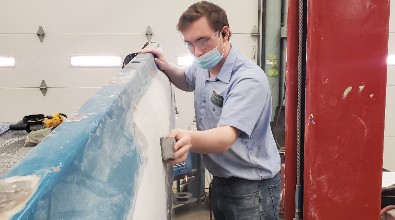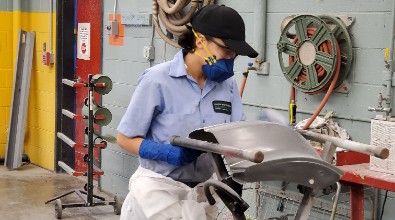Collision Repair Technology

Collision Repair Technology
Instructor: John Grim
The career outlook is good for well-trained Auto Body Repair Technicians. The future trends in automotive construction are moving toward the use of synthetic materials (plastics), therefore, more emphasis will be directed toward proper repair of plastic components.
Salaries are determined both by experience in the trade area and quality of workmanship. Apprenticeship Auto Body Technicians normally start on an hourly wage basis and move up to commission with experience.
In the global automotive repair industry, there is a growing demand for qualified auto body technicians. In this course, students are taught non-structural analysis, damage repair, and welding. Students work with a variety of materials, using metal finishing and body filling techniques to prepare surfaces and repair panels. Additionally, students are taught MIG welding/cutting, metal repair, corrosion protection, masking, refinishing, and unibody inspection. Students will practice shop safety and gain career skills.

Recommended Skills to Possess:
Possess the ability to be an active learner through understanding the implications of new information for both current and future problems.
Ability to determine the kind of tools and equipment needed to do a job.
Ability to understand written sentences and paragraphs in work-related documents.
Be service-oriented; actively looking for ways to help people.
Be able to consider the relative costs and benefits of potential actions to choose the most appropriate one.
Use logic and reasoning to identify the strengths and weaknesses of alternative solutions, conclusions or approaches to problems.
Be able to identify complex problems and review related information to develop and evaluate options and implement solutions.
Possess the ability to be an active learner through understanding the implications of new information for both current and future problems.
Ability to determine the kind of tools and equipment needed to do a job.
Ability to understand written sentences and paragraphs in work-related documents.
Be service-oriented; actively looking for ways to help people.
Be able to consider the relative costs and benefits of potential actions to choose the most appropriate one.
Use logic and reasoning to identify the strengths and weaknesses of alternative solutions, conclusions or approaches to problems.
Be able to identify complex problems and review related information to develop and evaluate options and implement solutions.
